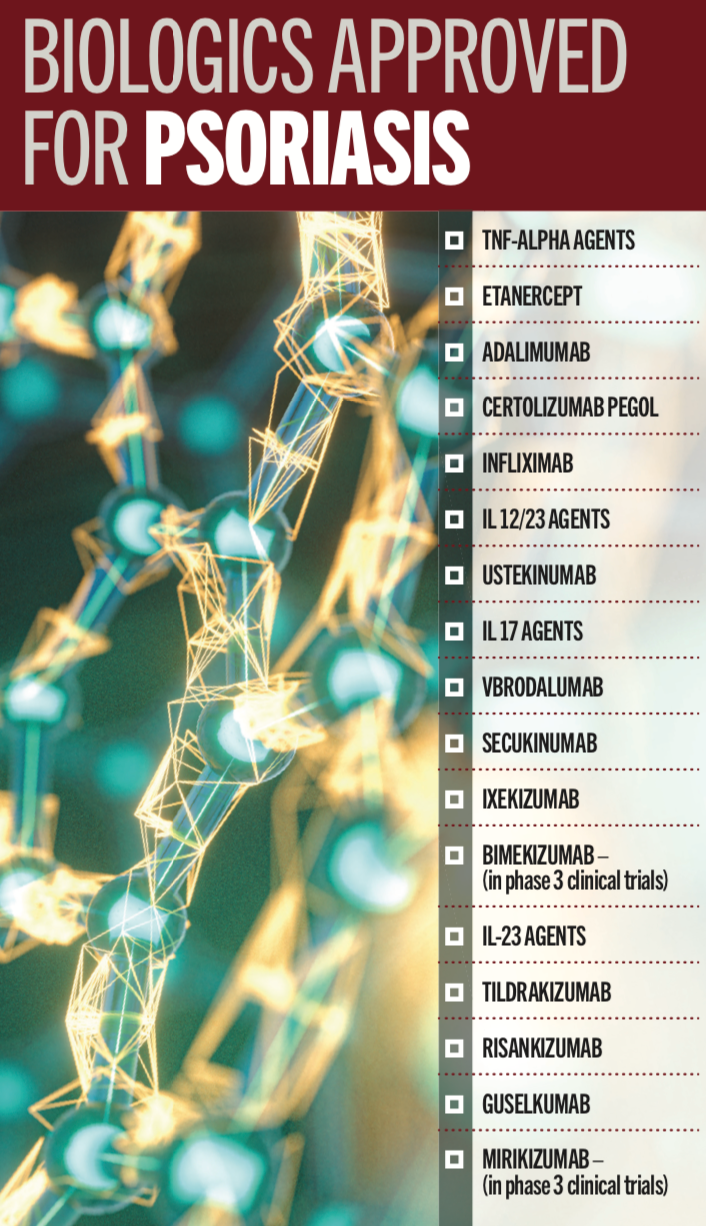- Acne
- Actinic Keratosis
- Aesthetics
- Alopecia
- Atopic Dermatitis
- Buy-and-Bill
- COVID-19
- Case-Based Roundtable
- Chronic Hand Eczema
- Drug Watch
- Eczema
- General Dermatology
- Hidradenitis Suppurativa
- Melasma
- NP and PA
- Pediatric Dermatology
- Pigmentary Disorders
- Practice Management
- Precision Medicine and Biologics
- Prurigo Nodularis
- Psoriasis
- Psoriatic Arthritis
- Rare Disease
- Rosacea
- Skin Cancer
- Vitiligo
- Wound Care
Publication
Article
Dermatology Times
Off-label Biologics Target Wide Range of Skin Diseases
Author(s):
Novel biologics are moving into off-label indications to expand the dermatologic armamentarium for a broad range of inflammatory skin diseases.
The dawn of the biologic in dermatology has become a therapeutic turning point for many patients suffering from skin diseases and conditions including psoriasis, psoriatic arthritis, and hidradenitis suppurativa (HS), among others. Now, the potential for off-label use of these novel medications could expand the armamentarium for a wide range of dermatologic diseases, according to David Rosmarin, MD, associate professor in the Department of Dermatology at Tufts University School of Medicine in Boston, Massachusetts.
“Novel biologic medications including TNF [tumor necrosis factor]-alpha inhibitors, anti-IL-17/23 agents, anti-IL-4 medications, and the JAK [Janus kinase] inhibitors, as well as a growing list of therapeutics in the pipeline being explored for off-label indications are proving to be very effective in treating an increasing number of common dermatologic diseases, including inflammatory skin disease,” Rosmarin said.
Continued research has led to the development and FDA approval of 11 biologics for the treatment of psoriasis and psoriatic arthritis, including etanercept, adalimumab, certolizumab pegol, infliximab, ustekinumab, brodalumab, secukinumab, ixekizumab, tildrakizumab, risankizumab, and guselkumab. The IL-17 and -23 inhibitors bimekizumab and mirikizumab, respectively, are biologics currently in clinical trials and are expected to receive FDA approval soon for psoriasis. Although these have all shown therapeutic success in psoriasis, Rosmarin noted that it is the off-label indications that have become “very exciting therapeutic prospects” for patients with challenging cases that are recalcitrant to tried standard therapies.
As TNF-alpha is very important in maintaining granulomas, the off-label use of medications such as adalimumab (Humira; AbbVie) and infliximab (Avsola; Amgen) have been shown to be effective in granulomatous diseases such as sarcoidosis and granuloma annulare.
“One of the adverse effects or risks that the patient has when taking TNF-alpha inhibitors is reactivation of tuberculosis because you need granulomas to wall off the Mycobacterium tuberculosis,” he said. “The same approach that puts the patient at a slightly higher risk is useful in treating these noninfectious granulomatous diseases like sarcoidosis and granuloma annulare,” Rosmarin said.
Currently, the TNF-alpha blocker adalimumab is the only FDA-approved treatment for HS. Both secukinumab (Cosentyx; Novartis) and bimekizumab are currently between phase 2 and phase 3 clinical trials (NCT04179175 and NCT03248531, respectively) for the off-label treatment of HS, according to Rosmarin.
There is an especially large focus on potential off-label indications for the JAK inhibitors. “The JAK inhibitors could also find therapeutic benefit in granulomatous diseases such as sarcoidosis and granuloma annulare, as well as other conditions such as lichen planus and lichen planopilaris,” Rosmarin said. “These can be helpful uses of JAK inhibitors, which are currently approved in dermatology only for psoriatic arthritis but are in development for atopic dermatitis, alopecia areata, and vitiligo.”
With the increasing number of biologics on the market, clinicians could find it challenging to choose the most appropriate treatment for each patient.

“The different aspects of the many biologics currently available allow us to pick and choose according to the patient’s individual needs,” Rosmarin said. “The choice of agent has to be tailored to the patient based on different concepts including what their goals are, potential side effects, comorbidities, or how fearful they are of injections, and these will help guide our decision in therapy.”
For example, IL-17 agents have some of the fastest response times, so they could be a good fit for patients who are looking for quick results. Patients who are fearful of injections could opt for ustekinumab (Stelara; Janssen Pharmaceuticals), risankizumab (Skyrizi; AbbVie), or tildrakizumab (Illumya; Sun Pharma), which are injected only every 3 months.
Dupilumab (Dupixent; Sanofi and Regeneron Pharmaceuticals) is a monoclonal antibody currently FDA approved for atopic dermatitis in patients 6 years and older and also has indications in other specialties for asthma and rhinosinusitis with nasal polyposis, however, there are multiple conditions for which the medication is being used off label. According to Rosmarin, dupilumab, which works well for pruritus, is also seeing therapeutic success in conditions such as bullous pemphigoid, and patients with the disease are being recruited for phase 3 clinical trials (NCT04256759 and NCT04823130).
“A lot of these elderly patients have significant pruritus accompanying their bullous pemphigoid and have a lot of comorbidities. So using a medication that has shown to be safe with very few drug interactions can be of significant benefit, is a great treatment option, and can be a paradigm shift in how we treat our patients with bullous pemphigoid,” Rosmarin said.
One of the next frontiers for the use of dupilumab is in fibrosing conditions. According to Rosmarin, there is some evidence of blocking IL-4 and IL-13 in scleroderma as well as using dupilumab for keloids. By blocking IL-13 in particular, dupilumab can have an antifibrotic effect, which can be a useful treatment in fibrosing conditions such as scleroderma, he added.
“It is really an exciting time to be in dermatology because we have all these new medications coming out,” he said. “It gives us the opportunity to have extra tools in our armamentarium to treat recalcitrant and challenging diseases.”
Disclosures:
Rosmarin has received honoraria as a consultant for AbbVie, Abcuro, AltruBio, Boehringer Ingelheim, Bristol Myers Squibb, Celgene, Concert Pharmaceuticals, Dermavant Sciences, Dermira, Incyte, Janssen Pharmaceuticals, Kyowa Kirin, Eli Lilly and Company, Novartis, Pfizer, Regeneron Pharmaceuticals, Sanofi Genzyme, Sun Pharma, UCB, and Viela Bio; has received research support from AbbVie, Amgen, Bristol Myers Squibb, Celgene, Dermira, Galderma, Incyte, Janssen Pharmaceuticals, Eli Lilly and Company, Merck, Novartis, Pfizer, and Regeneron Pharmaceuticals; and has served as a paid speaker for AbbVie, Amgen, Celgene, Janssen Pharmaceuticals, Eli Lilly and Company, Novartis, Pfizer, Regeneron Pharmaceuticals, and Sanofi Genzyme.
References:
1. Rosmarin D. Off-label use of biologics and new medications. Presented at 2021 American Academy of Dermatology Virtual Meeting Experience (AAD VMX) annual meeting; April 23-25, 2021; virtual.

























